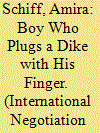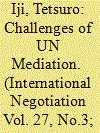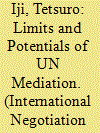|
|
|
Sort Order |
|
|
|
Items / Page
|
|
|
|
|
|
|
| Srl | Item |
| 1 |
ID:
187040


|
|
|
|
|
| Summary/Abstract |
This article highlights the United Nations’ potential contribution in the niche of crisis management. Drawing from the crisis-based approach’s insights on crisis mediation efficacy, and Carnevale’s conceptualization of the mediator’s various strengths as the sources of leverage in mediation, the study explores UN Special Coordinator for the Middle East Peace Process Nickolay Mladenov’s mediation during the Gaza-Israel crisis in 2018–2019. I argue that a combination of contextual and behavioral factors enabled Mladenov to influence the crisis bargaining environment and pull Israel and Hamas back from the brink. These factors included both parties’ need to avoid further escalation; the mediating skills of the UN envoy; the envoy’s reputation, which led others to perceive him as the right person for the mediation mission; the UN mediator’s use of a blend of strategies and tactics; and Mladenov’s ability to apply a range of strengths, including hard power.
|
|
|
|
|
|
|
|
|
|
|
|
|
|
|
|
| 2 |
ID:
187038


|
|
|
|
|
| Summary/Abstract |
This is the second of a two-part special issue of International Negotiation devoted to examining mediation conducted by the United Nations. The articles contribute to our understanding of the UN as an international mediator, notably its relevance and efficacy, and the challenges and opportunities it faces. Now, past its 75th anniversary, the UN can and still does mediate in the evolving international environment, showing a mixed track record of limitations and achievements in a variety of peacemaking engagements.
|
|
|
|
|
|
|
|
|
|
|
|
|
|
|
|
| 3 |
ID:
187042


|
|
|
|
|
| Summary/Abstract |
This article explores the working relationship between the United Nations (UN), African Union (AU), and the Economic Community of West African States (ECOWAS) in mediating conflicts in West Africa and the Sahel regions. We argue that through the United Nations Office for West Africa and the Sahel (UNOWAS), the UN, ECOWAS and the AU are working on mediation efforts to transcend traditional conceptualizations of the relationship between the world body and regional organizations. We show that the partnership is grounded on the logic of subsidiarity, informality, elite networks, technical competence, soft skills, and robust social trust. For heuristic purposes, we call the six principles the Chambas Formula, with reference to the centrality of the Special Representative of the Secretary-General for West Africa and the Sahel, Mohamed Ibn Chambas, and the emergence and consistent application of the principles in the mediation setting in West Africa and the Sahel regions.
|
|
|
|
|
|
|
|
|
|
|
|
|
|
|
|
| 4 |
ID:
187039


|
|
|
|
|
| Summary/Abstract |
What can UN mediators do to bring warring parties to a negotiated settlement? This article – using ripeness theory – focuses on the parties’ incentives to make a policy shift from war to settlement, and mediators’ influence over such incentives. Mediators can influence through utilizing leverage to create incentives by affecting the parties’ perceived relative power, and through applying intangible resources to facilitate incentive creation without affecting perceived relative power. The constraint on UN mediators is their lack of leverage, while their potential lies in their unique repertoire of intangible resources for facilitative influence. A recurrent limitation of UN mediation manifests where state mediators’ manipulative influence is needed to create the parties’ incentives, and UN mediators’ facilitative influence alone is not enough. On the other hand, UN mediatory potential can be utilized where the parties’ incentives are developed through their own actions and often in the face of pressure and leverage from external patrons.
|
|
|
|
|
|
|
|
|
|
|
|
|
|
|
|
| 5 |
ID:
187043


|
|
|
|
|
| Summary/Abstract |
This article discusses the inclusion of Colombian women in the Havana Dialogues with FARC through the theoretical lens of political representation. It chooses representation over the vaguer notion of inclusion to further politicize this debate. Since women’s inclusion is recognized as a major achievement of the process, the article attempts to reframe the discussion by enquiring whether Colombian women were represented in the process, and, if yes, which women and how. It argues that women’s inclusion was possible due to their multilevel articulation and a reluctant and diffuse representative dynamic bringing together female negotiators, the Gender Sub-commission and women’s movements.
|
|
|
|
|
|
|
|
|
|
|
|
|
|
|
|
| 6 |
ID:
187044


|
|
|
|
|
| Summary/Abstract |
The US-China trade war lasted for two years, resulting in a volatile environment for multinational businesses and exacerbating already heated Sino-American political tensions. Despite all the uncertainty it produced, the Phase One trade agreement was an economic ceasefire and not a negotiated agreement that resolved core issues in the Sino-American trade relationship. The US-China trade war negotiations failed to yield a successful negotiated agreement addressing core bilateral trade issues largely due to a mutually enticing opportunity to produce a ceasefire rather than address core issues, and process failures. The United States failed to collect information and apply expert advice in the diagnostic stage; both parties failed to establish a negotiation formula; and the US lacked an authoritative spokesperson. This led to a nearly-wasted two years of negotiations, which concluded with the Phase One trade deal declared in January 2020 due to both sides’ perception of a mutually enticing opportunity.
|
|
|
|
|
|
|
|
|
|
|
|
|
|
|
|
| 7 |
ID:
187041


|
|
|
|
|
| Summary/Abstract |
This article examines UN–EU cooperation over peace mediation. It compares their conceptual approaches to peace mediation and the evolution of their institutional capacities, demonstrating that the EU has learned from the UN, while actively supporting the strengthening of UN mediation capacity. The most important difference concerns the embeddedness of mediation in a broader foreign policy agenda in the case of the EU compared to the UN. The article also examines models of EU–UN cooperation in mediation practice. Drawing on an overview of cases of UN–EU cooperation, the article develops a typology of the constellations through which the two organizations have engaged with and supported each other. A case study on the Geneva International Discussions on South Ossetia and Abkhazia investigates the effectiveness of this coordination. The findings point to a high degree of effectiveness, although this has not yet translated into tangible mediation outcomes.
|
|
|
|
|
|
|
|
|
|
|
|
|
|
|
|
|
|
|
|
|